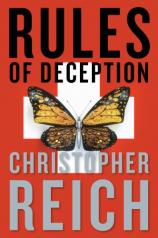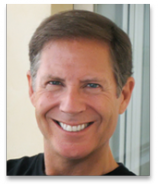Interview: July 18, 2008
July 18, 2008
Bestselling author Christopher Reich's latest work of fiction, RULES OF DECEPTION, is the first installment in a series featuring mountaineer and Doctors Without Borders surgeon Dr. Jonathan Ransom.
In this interview with Bookreporter.com's Joe Hartlaub, Reich describes how an encounter with General Tommy Franks inspired the plot of this book and discusses some of the real-life counterparts upon which his characters are based. He also sheds light on how he manages to balance his writing career with his family life, mentions some of his past and present favorite reads, and shares details about his current writing and travel plans.
Bookreporter.com: RULES OF DECEPTION features Dr. Jonathan Ransom, one of your most intriguing characters to date. Ransom is a physician with Doctors Without Borders who, after losing his wife during a skiing accident, finds himself thrust into a mysterious --- and deadly --- cat-and-mouse chase when he discovers that his wife has been leading a mysterious double life. The flashbacks concerning Ransom’s experiences while working with DWB are some of the most interesting, and poignant, in the book. Have you come into contact with that organization in the past? If so, in what capacity? And were any of Ransom’s accounts based on true events?
Christopher Reich: I’ve been a doctor “wannabe” since my time in college, when I roomed with two pre-med students. I first read about Doctors Without Borders 20 years ago. Since that time, I’ve followed their work with interest and concern. What excites me about the group is that they view themselves strictly as caregivers. Often they work in difficult political climates, but they never take sides in a conflict. It’s all about the patient. Many of the scenes depicted in the book are drawn from interviews with men and women who are DWB veterans. I don’t think there is a more selfless organization helping others in the world today.
BRC: Most of RULES OF DECEPTION takes place in Switzerland, a country to which you have significant familial and vocational history. Have you been turning the concepts behind the book over in your head for a while, or did the story behind the novel occur fairly recently?
CR: I first got the idea for RULES OF DECEPTION about four years ago. At the time, I was working on a television pilot called “The Diplomat,” to star Christopher Lambert. One of our consultants was General Tommy Franks. Franks spoke admiringly about some of the work done by members of the Joint Special Operations Command (JSOC), men and women he called “operators.” The stories were straight out of “Mission: Impossible.” But they were all true…amazingly so. Franks was clear on one point: his “operators” never spoke about their missions. Never. The germ for RULES OF DECEPTION was planted right then and there. I started wondering what would happen if you were married to one of these operators and didn’t know it.
I set the book in Switzerland because I know the country so well and find it the most romantic, exciting, beautiful place in the world.
BRC: A part of RULES OF DECEPTION turns upon “dual use” technology, with respect to materials and equipment that can be utilized for both peaceful and military ends. These not only play a role in what occurs in the book but also, in a very strong way, serve as a metaphor for a number of the principal characters in the story. What sparked your interest in dual use developments as a springboard for a plot line?
CR: When the story about Dr. A.Q. Khan, the founder of the Pakistani nuclear weapons program --- and later the man who sold nuclear plans to dozens of countries around the world --- broke, I read every page. I wanted to figure out a way how one could get around all the so-called restrictions on nuclear weapons technology. To my chagrin, I found out it wasn’t that difficult. If you go back over the years, there has always been one individual, a company, or a country willing to supply the equipment necessary to enrich uranium or to help in other facets of building a “bomb.”
BRC: Does the technology exist for the “butterfly” and the “drone” prototypes, as used in RULES OF DECEPTION, or are you extrapolating their existence based on what we know now? If it does exist, who has it? And for what purposes is it presently being used?
CR: All the technology described in the book exists….and more. Drones and unmanned aerial vehicles are at the forefront of our military research. For good reason: it's better to have machines in combat than human beings. But, yes, all that stuff about the butterfly and the drone is absolutely real. Scary, isn’t it?
BRC: Another secondary, but important, plot point in RULES OF DECEPTION turns on international banking practices and the situations you create. You have some vocational history in the field and have utilized elements of international banking in some of your other novels. Did you base any of the banking characters upon real-world individuals who you have encountered? If so, do you think they would recognize themselves?
CR: Now you’re asking about some private information! To tell you the truth, I often base my characters upon real acquaintances or upon figures I’ve read about in the news. I based the character of Tobias Tingeli on a Swiss banker, and member of the Rothschild banking dynasty, who was shot dead a few years ago by his mistress in Geneva. At the time of his murder, he was wearing a body-length rubber latex suit with only eye and mouth holes cut out. Pretty weird, huh? I can’t make that stuff up.
BRC: RULES OF DECEPTION features a fairly complex plot with a number of different players who are seemingly at odds with each other. At the same time it is very readable, never becoming bogged down in its own details while maintaining a quick, strong pace. While you were writing it, what steps did you go through to maintain both plot integrity and readability without sacrificing one element for the other? Do you have a select group of people to whom you go to read your work in progress, or do you rely entirely on yourself to determine whether you are on the right track?
CR: Its very difficult to keep a complicated plot simple. But I had some good teachers --- namely, the works of Frederick Forsyth and John le Carré, both of whom could tell incredibly complex tales without confusing the reader. The key is to break the story apart into logical chunks, each of which advances the plot a little at a time. With RULES OF DECEPTION, I felt that the story was so real that it practically told itself.
As for readers, I rely first on my wife, then on my agent, Richard Pine, Elisa Petrini, and my editor at Doubleday, Stacy Creamer. Writing books like these is a team effort, and I’m grateful to the superlative talents of these individuals. The best part is that they make it fun.
BRC: You dedicate RULES OF DECEPTION to your daughters. Since some of our readers may be laboring over their own manuscripts, they will want to know: How do you balance the duties of family with the demands of writing? What is your writing schedule like? Does it vary appreciably from when you first began your writing career? And has your schedule become easier or more difficult to follow over time?
CR: I’ve always treated writing as a profession no different than any other. I go to work at 7 and I work until 5 or 6, taking an hour for lunch. There’s no substitute for time spent at your desk. It’s as simple as that. The discipline I learned as an investment banker has served me well. I guess the bottom line is that you can’t wait for a muse to land on your shoulder and inspire you. Like everything else, you have to dig down and gut it out. Oh, and the last thing --- it never gets easier, because I’m always trying to get better.
BRC: You are known for novels that stand alone as opposed to series works. What made you decide to start a series now? Do you have a vision for how long the series may go on?
CR: I didn’t start RULES OF DECEPTION with the idea of it being a series. About halfway through it --- that is to say, after about seven months --- I realized that Jonathan Ransom was the hero I’d always wanted to write. He came alive to me in a way that others (since Nick Neumann in NUMBERED ACCOUNT) hadn’t. And of course, I love Emma. She’s the 21st-Century Woman. It's going to be good fun sending Jonathan all around the world.
BRC: You have noted that one of your favorite authors is Franklin W. Dixon, the creator of the Hardy Boys series. Which book in that series is your favorite? Why? And how did you discover them originally?
CR: The Hardy Boys ignited my love of reading. I don’t have a favorite; they were all wonderful. But I loved other writers as well, notably John Steinbeck, James Clavell, Len Deighton and Frederick Forsyth. If you ask me my favorite books, they’re all thrillers of one type or another. NOBLE HOUSE, THE DAY OF THE JACKAL, NIGHT MANAGER by John le Carré and JAWS by Peter Benchley. (The book is better than the movie.)
BRC: What book have you read in the past six months that you are recommending to people?
CR: I loved THE DAWN PATROL by Don Winslow and THE GHOST by Robert Harris. I’m hearing great things about THE STORY OF EDGAR SAWTELLE, as well. I have it on my night table and can’t wait to get to it.
BRC: What are you working on at the moment? Do you ever take time off from writing, or do you have the need to always be working on something?
CR: I’m just finishing up RULES OF VENGEANCE, the sequel to RULES OF DECEPTION. This one is set in London, Italy, and the South of France. I’m answering these questions while on vacation in Catalina Island. We come here every year for the 4th of July and just love it. I love writing, but I love vacations, too. After my book tour, we’re heading over to Switzerland for three weeks. We have lots of friends and family there, and bounce between Zurich, Ascona and Zermatt. Mountain climbing is my new passion and I hope to get up the Matterhorn this year. Wish me luck!




